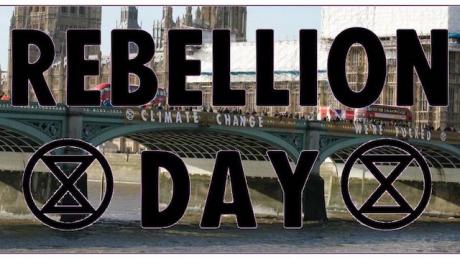It is high time for this discussion to begin publicly and we thank Richard for having the courage to do so.
Richard Murphy is Professor of Practice in International Political Economy, City University of London. He campaigns on issues of tax avoidance and tax evasion, as well as blogging at Tax Research UK
Cross-posted from Tax Research UK

I have done several posts on Extinction Rebellion (XR) this morning, and rightly so: what they are doing is incredibly important and I support much of it.
But what I have sensed on the blog over the last few days has been a tension between those who think there is no room to compromise on the demand for net-zero carbon by 2025 that XR promote, suggesting that even 2030 is too late and the proposals of the Green New Deal Group. And in the process criticism has been levelled at the Green New Deal plan for ensuring 30 million buildings in the UK are made as efficient as possible, as if this goal is insufficient when it is, in fact, necessary. In the process a second concern has been raised, which is that the Green New Deal might engage the private sector in the delivery of its plans. I will be candid: I really do not see any alternative.
I admire the radicalism of Extinction Rebellion. But, as Roger Hallam explains in the book to which I have linked this morning, whilst its objective is radical social change, and that is almost certainly necessary and something that I discussed in my book The Courageous State, the process of creating the necessary change to achieve that radical outcome is necessarily short-lived: the Extinction Rebellion can only last a few months, at most, if it is to work.
Extinction Rebellion then suggests that citizens assemblies must decide the future direction of the country. I admit this is where I differ: I believe that it is wholly unfair to place the burden of deciding the future upon people who have not sought the task, and may not be able, emotionally or otherwise, to handle the responsibility given to them on a sortation basis. That we need radical change I do not dispute. But if there is too be a citizen’s assembly the most that I think might be asked of it is to choose an alternative electoral method. Thereafter I do not think we can avoid the need for a Parliament, and I would not wish to do so.
And for those who might pin their hopes on a People’s Assembly to deliver radical change in the economic and social structure of the UK so that privately owned business ceases to be a part of the social infrastructure of the country I think I have some bad news: that is really not going to happen in this country where so many are engaged in that sector, and happily so. I want, seek and have worked for radical change in the way business should be regulated, and think that is wholly desirable. But to seek private businesses abolition? I can see no way that is going to happen. And that will include large business as well as small, some sectors (maybe) apart.
Why say all this? Because I am a carbon radical: I think 2030 is a necessary goal. It’s also the earliest, in my opinion, that is pragmatically possible. And that is the key issue. Pragmatically those in Extinction Rebellion are leading the way. And they will, I sincerely hope, achieve radical change because nothing less than that is essential. But when the Extinction Rebellion is over the question will be ‘what do we now?’And the answer to that is ‘the Green New Deal’, just as the answer to occupy was ‘deliver tax justice’.
So, we will come back to what is pragmatically possible, like it or not.
And at that point pragmatism will say that making 30 million buildings energy efficient will be very high on the list of priorities. Because people are not going to stop living in them. And people are not going to stop working. And so the emissions from this source must be tackled.
And we will need people, many of them organised in businesses, to do this work, up and down the country.
So there is no conflict between Extinction Rebellion and the Green New Deal. It’s all about timing. That’s all.
Right now XR is taking the headlines and creating the environment for change. But we will need a Green New Deal when that environment is created. Of that I am sure.


Be the first to comment